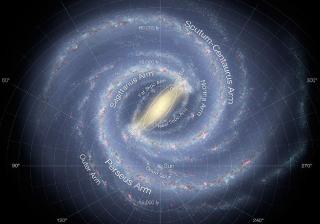Bibcode
Wang, H.; López-Corredoira, M.; Carlin, J. L.; Deng, L.
Referencia bibliográfica
Monthly Notices of the Royal Astronomical Society, Volume 477, Issue 3, p.2858-2866
Fecha de publicación:
7
2018
Número de citas
41
Número de citas referidas
40
Descripción
We present a three dimensional velocity analysis of Milky Way disc
kinematics using LAMOST K giant stars and the GPS1 proper motion
catalogue. We find that Galactic disc stars near the anticentre
direction (in the range of Galactocentric distance between R = 8 and 13
kpc and vertical position between Z = -2 and 2 kpc) exhibit asymmetrical
motions in the Galactocentric radial, azimuthal, and vertical
components. Radial motions are not zero, thus departing from circularity
in the orbits; they increase outwards within R ≲ 12 kpc, show some
oscillation in the northern (0 < Z < 2 kpc) stars, and have
north-south asymmetry in the region corresponding to a well-known nearby
northern structure in the velocity field. There is a clear vertical
gradient in azimuthal velocity, and also an asymmetry that shifts from a
larger azimuthal velocity above the plane near the solar radius to
faster rotation below the plane at radii of 11-12 kpc. Stars both above
and below the plane at R ≳ 9 kpc exhibit net upward vertical
motions. We discuss some possible mechanisms that might create the
asymmetrical motions, such as external perturbations due to dwarf galaxy
minor mergers or dark matter sub-haloes, warp dynamics, internal
processes due to spiral arms or the Galactic bar, and (most likely) a
combination of some or all of these components.
Proyectos relacionados

Morfología y dinámica de la Vía Láctea
El Proyecto se estructura en dos partes, diferenciadas pero complementarias: morfología y dinámica. El estudio detallado de la morfología de la Vía Láctea pretende proveer una base de datos de distribución estelar en las regiones más alejadas y extintas de nuestra Galaxia, mediante el desarrollo de modelos semiempíricos a partir de la información
Martín
López Corredoira